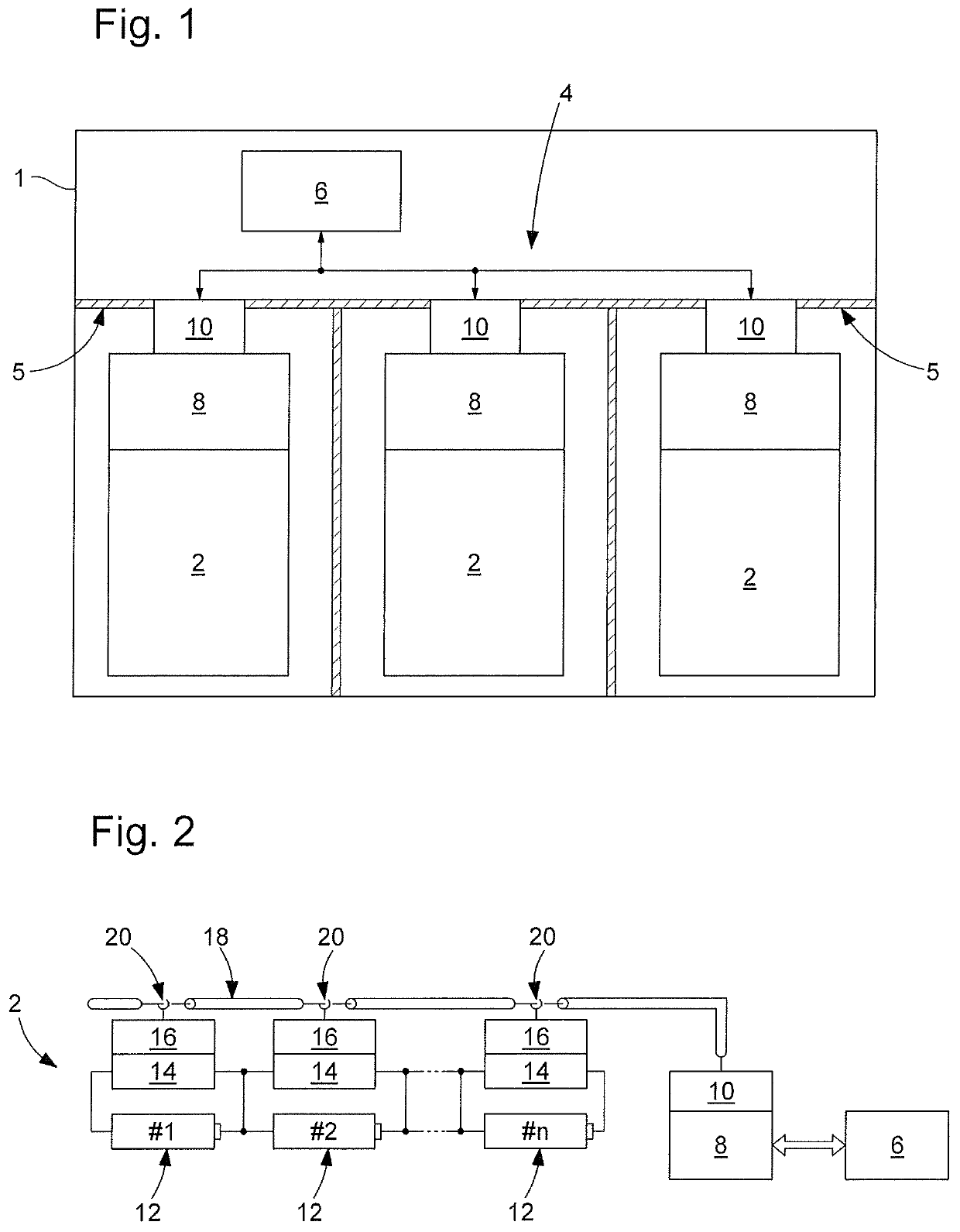System for managing at least one sub-assembly of an electric battery
a technology for electric batteries and sub-assemblies, which is applied in the direction of battery/fuel cell control arrangement, secondary cell servicing/maintenance, electric devices, etc., can solve the problems of significant excess weight of the system, difficult to maintain the integrity of analogue or digital signals relative to sources of electromagnetic disturbance of signals, and the number of wired connections comprised in the system to be reduced, and the effect of low cos
- Summary
- Abstract
- Description
- Claims
- Application Information
AI Technical Summary
Benefits of technology
Problems solved by technology
Method used
Image
Examples
first embodiment
[0044]According to this first embodiment, the capacitive coupling means 20 are formed by a part for separating the strands 22. The separating part 20 is inserted between, on the one hand, the two strands 22 of the twisted pair 18 and on the other hand the communication circuit 16 of the power storage cell 12. More specifically, as shown in FIG. 4, the separating part 20 comprises a plastic base 28 on which a movable cover 30 is mounted. The movable cover 30 is, for example, mounted on the plastic base 28 via a hinge-forming means 32. The plastic base 28 defines two semi-cylindrical longitudinal cavities 34, the longitudinal direction being considered to be the direction in which the loss cable 18 extends. Inside each semi-cylindrical cavity 34, substantially in the centre of the cavity 34 and over the entire length of the base 28, a longitudinal groove 36 is made, passing through the thickness of the base 28 and opening externally thereto. The part 20 further comprises a metal coati...
second embodiment
[0047]As shown in FIG. 2, according to this second embodiment, the capacitive coupling means 20 are formed by a cable pass ring 18. The ring comprises, on the inner surface thereof, a metal coating, and the loss cable 18 is inserted into the ring 20 of each power storage cell 12. The metal coating of the ring 20 is, for example, connected to the communication circuit 16 of the cell 12 via a microstrip electric line. Such an electric line acts as a guide to an electromagnetic wave propagation, and is formed by a conductive strip deposited on a dielectric substrate, the second metallised face whereof acts as a ground plane. The data signal is thus present on the metal coating of the ring 20, and the ring 20 allows the coaxial cable 18 to be coupled, by capacitive coupling, to the communication circuit 16.
[0048]Although not shown, the coaxial cable could be considered to be bonded to the battery and capacitive coupling takes place between the battery elements, i.e. between the loss cab...
PUM
| Property | Measurement | Unit |
|---|---|---|
| carrier frequency | aaaaa | aaaaa |
| carrier frequency | aaaaa | aaaaa |
| frequency | aaaaa | aaaaa |
Abstract
Description
Claims
Application Information
 Login to View More
Login to View More - R&D
- Intellectual Property
- Life Sciences
- Materials
- Tech Scout
- Unparalleled Data Quality
- Higher Quality Content
- 60% Fewer Hallucinations
Browse by: Latest US Patents, China's latest patents, Technical Efficacy Thesaurus, Application Domain, Technology Topic, Popular Technical Reports.
© 2025 PatSnap. All rights reserved.Legal|Privacy policy|Modern Slavery Act Transparency Statement|Sitemap|About US| Contact US: help@patsnap.com


